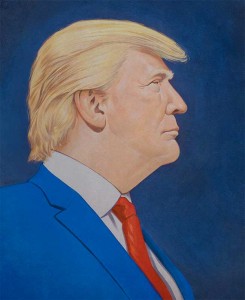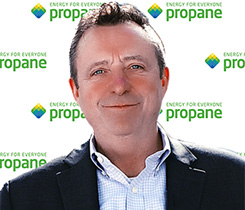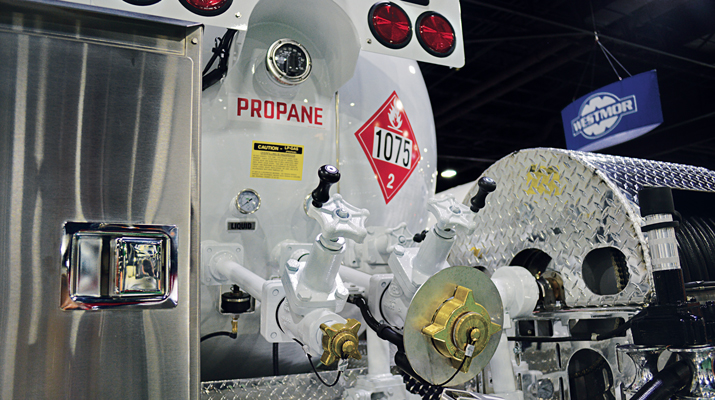Propane industry explores Trump’s rise at annual lobbying event
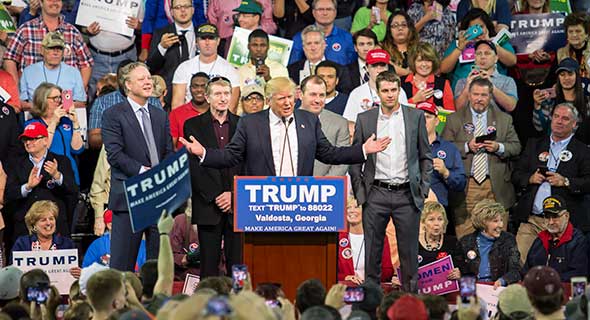
The scene surrounding presumptive Republican presidential nominee Donald Trump has been typical throughout his campaign, with large crowds filling venues across the United States. Photo: iStock.com/mphillips007
The people come in droves, filling venues to capacity across the United States to see the spectacle.
The spectacle is not of the Ringling Bros. and Barnum & Bailey variety, although it is sometimes characterized as having circus-like elements. Like a ringmaster, the centerpiece of the spectacle regularly plays to the crowd’s delight, shouting select phrases to reenergize the people when the excitement of the event wanes.
Unlike a circus, the spectacle has a tendency to go unscripted. That unpredictability is part of the attraction, as no two roadshows are alike.
So what is this spectacle? It is, of course, Donald Trump, the presumptive Republican nominee for president, and his nontraditional campaign.
Trump is unlike any political figure in U.S. history, nearing his party’s nomination despite a series of controversies – a number of which were self-inflicted – and a campaign tone that lacks the decorum Americans have historically expected of presidential candidates.
Still, Trump is the one Republican left standing among the field of 17 who pursued the 2016 presidency. Considered a long shot when he announced his candidacy more than a year ago, Trump has done something right to successfully connect with a portion of the American people.
Trump has tapped into the discontent, and he’s become an unlikely voice for change in Washington.
Sen. Bernie Sanders, I-Vt., has also tapped into discontented Americans this election cycle. He nearly overcame former Secretary of State Hillary Clinton, the presumptive Democratic nominee, who offers voters a more politics-as-usual approach.
Clinton, like the bombastic Trump, is far from a perfect candidate. She too has a likeability issue, although hers stems most notably from an ongoing email scandal.
The intricacies of the unprecedented 2016 presidential campaign were explored at the National Propane Gas Association’s (NPGA) Propane Days lobbying event in Washington, D.C., where Rep. Chris Collins, R-N.Y., and “Fox News Sunday” host Chris Wallace shared insights before a propane marketer-heavy audience.
“This is the craziest campaign I have ever covered,” says Wallace, a journalist who has covered Washington, D.C., politics across four decades. “The reason, of course, is Donald Trump. He’s unlike any presidential candidate in my career. He’s erratic and sometimes almost purposely uninformed. He’s great at sizing up an opponent and crowd to his advantage.”
How we got here
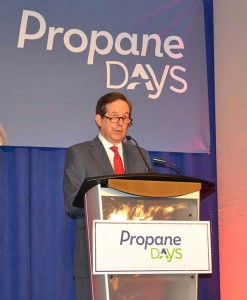
Fox News’ Chris Wallace expects House Speaker Paul Ryan, R-Wis., to “show” unity with presumptive Republican presidential nominee Donald Trump by the time the Republican National Convention starts this month in Cleveland. Photo by Brian Richesson
Wallace admits he never thought Trump would emerge as a presidential candidate, let alone overcome the countless missteps he’s taken on the campaign trail.
Yet, Trump is the Republican Party’s presumptive choice for president.
“I thought he would self-destruct on his attack on Mexicans as rapists, and (Sen.) John McCain, (R-Ariz.), for getting captured [during the Vietnam War], and on and on,” Wallace says.
Wallace opened up last fall to the possibility of Trump winning the presidency. Wallace says he told Trump this in his first interview with him as a candidate last October.
“I finally got what so many people see in him: a voice against politics as usual, that the games on Wall Street are rigged while the special interests have cushy seats at the table,” Wallace says.
But distrust of Trump remains – even within his own party. As Wallace referenced at Propane Days, Trump got into a squabble with House Speaker Paul Ryan, R-Wis., shortly after eliminating Sen. Ted Cruz, R-Texas, and Gov. John Kasich, R-Ohio, from the Republican race. Ryan raised questions about Trump’s authenticity as a conservative, Wallace says, and Trump fired back.
“The speaker said we want a standard bearer who bears our standards,” Wallace says. “Not surprisingly, Trump did not react well to that. He made it clear that as the person who has won the nomination, he thinks it’s Ryan’s job to sign onto his agenda – and not the other way around.”
Trump personally met with Ryan following the House speaker’s remarks, and, as Wallace describes, the two struck a note of public harmony. But the fact remains that the presumptive Republican nominee for president and the Republican leader in the House of Representatives have vastly different ideals, Wallace says.
“When you look at Trump and Paul Ryan, you are looking at two people who could not be more different,” Wallace says. “Ryan really believes what he says, and he desperately wants to find a way to reform and slow down growth of entitlements because he believes they’re going to run our national financial [system] dry. He’s generally offended by what Trump has said about illegal immigrants, Muslims and women.”
One supporter’s take
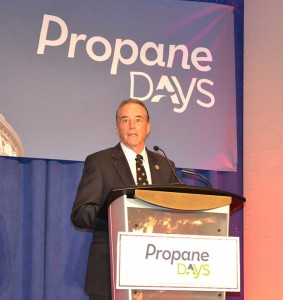
Rep. Chris Collins, R-N.Y., says the 2016 presidential election is “the most important election any of us have ever voted in when you consider [the United States] on trade, the international front and the Supreme Court.” Photo by Brian Richesson
“We’re united 10 weeks sooner than we thought,” says Collins, referring to the fact that Trump avoided a contested Republican National Convention. “Everyone said ‘brokered convention,’ ‘we’ll be fractured till the end’ and ‘Hillary’s leading by 30 points.’ Donald Trump locked it up May 4. Hillary Clinton is the unifier of our party.”
Collins, who was the first member of Congress to endorse Trump, shifted his support to Trump after publicly backing former Gov. Jeb Bush, R-Fla. Collins gravitated toward Bush and later Trump because he believes the nation needs an experienced chief executive in the White House rather than a legislator who agonizes on the issues and fears making decisions.
“I come out of the fast-paced private sector where I’ll make 15 decisions in an hour,” says Collins, who has 36 years of experience in the private sector as a small businessman.
“If I make 13 good decisions, we’re moving the ball downfield.”
A former governor like Bush has the experience to make decisions in the White House, Collins adds. But after Bush suspended his campaign following the South Carolina primary, Collins shifted to Trump.
“When the dust settled and Jeb Bush flamed out after South Carolina, I said there’s only one chief executive there,” Collins says. “I looked at Donald Trump, and I agree with him on labor and trade. We’ve been at war with Mexico on trade for years [through] currency manipulation. [They] don’t abide by labor laws; no workers’ comp. They have a 35 percent built-in advantage.”
Free and balanced trade is necessary for the U.S. economy to prosper, Collins adds.
“We need our jobs back,” he says, delivering the remark to propane marketers immediately ahead of their scheduled lobbying meetings on Capitol Hill. “Today, [when meeting with your congressman], emphasize the jobs piece of your business because this country needs more jobs coming in.”
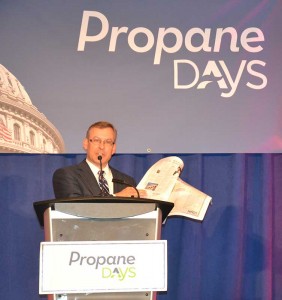
NPGA’s Phil Squair addresses Propane Days attendees ahead of meetings with their congressional leaders and representatives in Washington, D.C. Photo by Brian Richesson
At Propane Days, Collins didn’t venture into specifics related to the troubles Trump has stirred on the campaign trail, although Collins admits he disagrees with Trump on some issues. Instead, Collins focused elsewhere and challenged marketers to consider the outcome if the United States were to lose its economic standing in the world.
“We’re 4 percent of the world’s population and 25 percent of the world’s economy,” he says. “The rest of the world wants our [25 percent] to be 4. If we’re going to protect our kids’ future, we have to maintain the 4 and 25. We are at war for the rest of our lives [against] the rest of the world who wants our jobs and feel they deserve our jobs because we have a disproportionate percentage of the world’s economy.
“When you realize that, then you go to the negotiating table with a different mindset,” Collins adds.
Trump’s ability to negotiate effective deals is a key reason he’s garnered Collins’ support.
“We spend money standing up for the world’s freedoms,” Collins says. “As we are fighting to defend our jobs, you don’t sit down and negotiate TPP (the Trans-Pacific Partnership). You tell the other side what the terms are, and you turn around and walk out of the room. Why are we going to negotiate with China, Mexico or Vietnam? We are buying more from them than they are buying from us.”
Free and balanced trade also means protecting the nation’s borders and potentially imposing higher tariffs, Collins says.
“Maybe you pay more for your underwear or toaster, but it’s made in America and that creates American jobs,” he says. “We need a chief executive who’s holding four aces. When you’re holding four aces, the ‘negotiation’ takes a different tone.”
Weighing the decision
Left to absorb the Collins and Wallace commentaries in Washington was a roomful of propane marketers, many of whom, like Wallace, are perplexed by the developments this campaign season.
“I’m not a big fan of Hillary, and I am somewhat concerned with her perceived socialistic tendencies,” says Doug Auxier, owner of Auxier Gas in Batavia, Ohio. “But I’m also concerned on the other side. I have a tremendous amount of respect for Donald Trump’s business acumen, but I’m concerned with the strife we’ve seen throughout this campaign. We’re very divided, and I have a real problem thinking he’s going to bring the country together.”
Other propane marketers have similar concerns, Auxier adds. A number of marketers are weighing their conservative principles with the Republican candidate at hand.
“Typically our industry is conservative,” he says. “I don’t think there’s any question about that. It’s because of who we are. Most of us are small businessmen. Even though we might not be really thrilled with Donald Trump, that’s who we would probably vote for.
“Of course, everything can change when it comes time to vote,” Auxier adds. “You can change your mind and say what’s best for the country.”
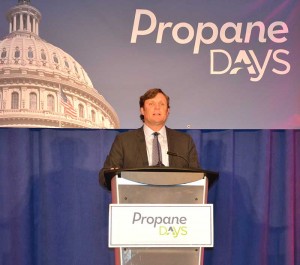
Says Stuart Weidie, president of Blossman Gas: “We as an industry have to maintain what we stand for and how we conduct ourselves, even in the absence of [it in] more general society.” Photo by Brian Richesson
“The environment is a bit disconcerting, but it doesn’t prohibit us from continuing to live by the values that we believe are important,” Weidie says. “It’s very difficult to understand what anybody means because they never say what they mean anymore. It’s in stark contrast to how we in the propane industry conduct our lives. We always strive to do what we say.”
Considering the “my-word-is-my-bond” notion by which marketers live, it’s easy to gather why marketers are grappling with electing a candidate who, in Wallace’s words, is “flexible on a lot of issues.”
“It’s a choice between someone you believe possesses the temperament and the virtues to lead our country, but also someone who will stop the expansion of this regulatory scheme that has become more oppressive,” Weidie says. “There is a choice. It may be more challenging to make that choice for some. What you hold most dear is going to be the driving force.”
One of Weidie’s fears is the propane industry following the path of the banking industry.
“The banking industry is consolidating into larger banks because smaller community banks cannot afford to deal with all of the regulatory compliance requirements the federal government is placing on them,” he says. “I absolutely do not want that to happen to our industry. We want to have a business environment that is fair and reasonable.”
Considering the nation’s divide, a return to shared values seems a long way off. However, a return is possible, according to Weidie.
“People at their most basic level crave predictability, and a shared value code provides that predictability,” he says. “But when anything goes, people get confused as a country and as a society. We will return to these value codes that provide stability for us as individuals. I think we can maintain our little corner of the world of the propane industry and await the return of more traditional values.”
Whether Donald Trump is the one who can steer the nation’s return to those values is a question that remains unanswered.
“I think if Trump is elected it will affect the country more, whether it’s good or bad,” Auxier says.
Related articles:








